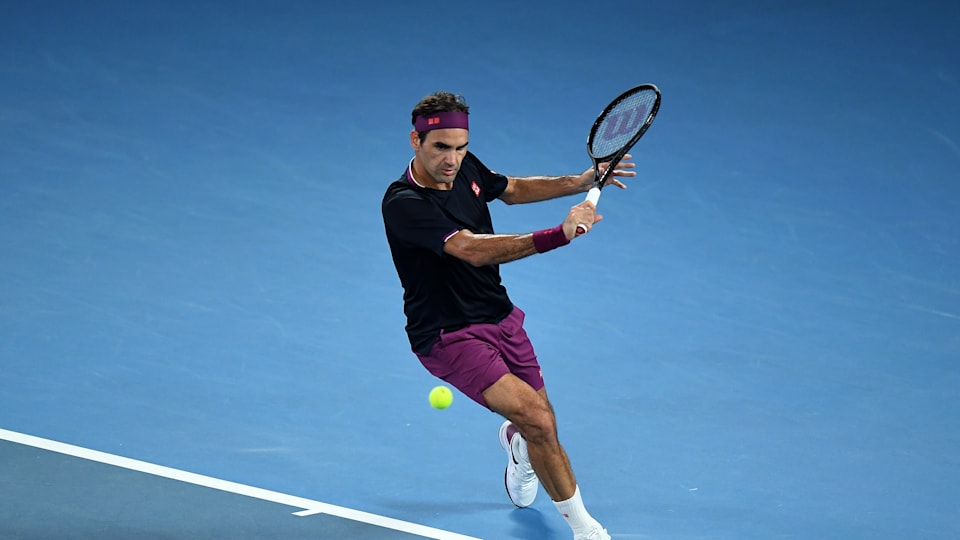
Roger Federer would like nothing more than to be at the Tokyo Games this summer.
And to win a gold medal in men’s singles? That would make it that much better.
The megastar tennis player, who turned 39 in August, revealed in Doha that he has every intention to play in his fifth Olympics in 2021.
"The Olympics is a major goal for me," said Federer ahead of his return to competitive tennis after 13 months out with a knee problem.
"Unfortunately, I missed the Rio Olympics because of a left knee injury. I hope I will return to the Tokyo Olympics."
Having won gold in doubles alongside Stan Wawrinka at Beijing 2008 and earning the silver in singles at London 2012 (Andy Murray beat him in the final), Federer is still chasing one of the few things in tennis he hasn’t accomplished: Singles Olympic gold.
“[My] big plan is to be there [in Japan] for the Olympics,” Federer told fellow Olympic medallist Kei Nishikori, the Japanese player, in an online chat between the two.
“This is for me the big one. Maybe selfishly for me it has not been a bad thing that it was actually [postponed] a little, you know because of the problems I had last year.”
Federer's challenging 2020: Knee surgery and more
Federer’s “problems” in 2020 went beyond the COVID-19 pandemic as he had knee surgery in February. He then revealed in June that he would be sidelined for the rest of the season to recover, missing both the U.S. and French Opens.
“I will look forward to seeing everyone back on tour to start the 2021 season,” he wrote on social media in June.
But it was not meant to be as he decided to skip the Australian Open as well.
Federer and the Olympics: A timeline
He made a splash of a debut at Sydney 2000, ranked just 36th but making his way to the semi-finals, where he lost to Germany’s Tommy Haas. He would be denied a medal in the bronze match, losing in three close sets to Arnaud Di Pasquale of France.
In 2004, when Federer first became world No.1 off his maiden major wins at Wimbledon and the Australian Open, he lost in the second round at Athens 2004 to Tomas Berdych, a Czech player who was then ranked No.79 in the world.
Four years later, this time as the No.2 seed, Federer progressed to the Beijing 2008 quarter-finals. He faced American James Blake there, owning an 8-0 mark against the 7th-ranked Blake. But Federer would lose that match, only to be buoyed by his gold medal in doubles alongside Wawrinka a few days later.
London 2012 was Federer’s best performance in singles, including a four-hour, 28-minute win over Juan Martin Del Potro in the semi-finals, the longest-ever three-set match (in the sport’s Open Era). With no tiebreak in the third set, Federer and Del Potro battled for nearly five hours. And while the Swiss star would emerge the victor, his body could not withstand the rigors of then trying to back up a best-of-five-set final vs. Murray, whom he had beaten just weeks prior on Wimbledon’s Centre Court for his seventh title there.
Murray won the Olympic final in straight sets.
In 2016, Federer missed the Rio Summer Games due to a knee injury that set him out for the remainder of that season.
Historic quest for gold
Only Nadal (Beijing 2008) and Andre Agassi (Atlanta 1996) have completed the feat of winning all four majors in tennis as well as Olympic gold. Djokovic, the current world No.1, is also still seeking singles gold, a goal for him at Tokyo 2020, as well.
Federer has bounced back previously in his career, including the aforementioned 2016 knee injury, when he would go on to win the Australian Open and Wimbledon in 2017, his first major titles in nearly five years.
Turning 40 this August, however, he has been careful with his body in what is an increasingly physical sport. Federer credits his Swiss fitness coach, Pierre Paganini as a key factor for the limited amount of injuries in his career.
Previously, Murray has expressed desire to go after a third consecutive gold medal in Tokyo, having been victorious in both London and Rio, though he has dealt with injuries, surgeries and subsequent comebacks himself.
It remains to be seen: Will the sport’s “Big 4” be the main talking points come Tokyo 2020? Or could breakthrough winners like Dominic Thiem (US Open), Daniil Medvedev (ATP Finals), Stefanos Tsitsipas (Finals, 2019) or others be the ones in contention for medals?
“Let’s hope for the best for the Olympic Games coming to Tokyo next year, this is also one of my big goals,” Federer said in his recent chat with Nishikori. “I really hope I can come back to Tokyo for that.”
